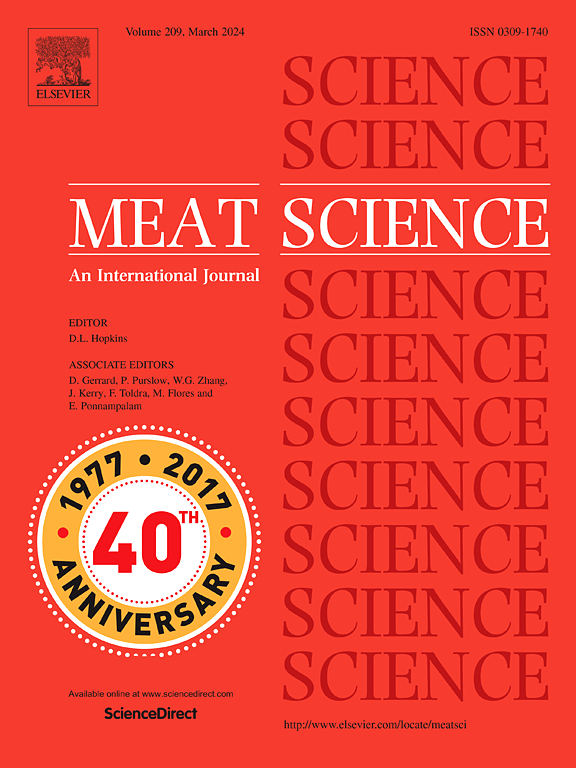Source of dietary iron and zinc affects meat quality by altering muscular fatty acid profile, flavor substances, and metabolomics in finishing pigs
IF 6.1
1区 农林科学
Q1 Agricultural and Biological Sciences
引用次数: 0
Abstract
This study evaluated the effects of dietary iron and zinc supplementation from inorganic (CON) and organic sources (ORG) on growth performance, meat quality, fatty acid profile, and metabolome in pigs. Growth performance was unaffected by the treatments, but carcass traits such as loin muscle area, hot carcass weight, and yield in the ORG group were higher than in the CON group. The ORG supplements improved the quality (color, pH, shear force, marbling scores, IMF, IMP, and zinc) of raw meat and sensory traits (odor, flavor, tenderness, juiciness, and soup freshness) of cooked meat. Postmortem time significantly affected meat quality such as L*, a*, b*, and pH, as well as interacted with diet to affect pH of the LT. The ORG supplements altered fatty acid composition of pork. The results indicated that organic iron and zinc improved carcass traits, pork quality, and eating acceptability by increasing flavor substances and by altering fatty acid profile and metabolome.
饲粮铁和锌的来源通过改变肥育猪的肌肉脂肪酸谱、风味物质和代谢组学来影响肉质
本研究评估了饲粮中添加无机(CON)和有机(ORG)来源的铁和锌对猪生长性能、肉品质、脂肪酸谱和代谢组的影响。生长性能不受各处理的影响,但ORG组的胴体性状如腰肌面积、热胴体重和产量均高于CON组。ORG补充剂改善了生肉的质量(颜色、pH值、剪切力、大理石纹分数、IMF、IMP和锌)和熟肉的感官特性(气味、风味、嫩度、多汁性和汤的新鲜度)。宰后时间显著影响肉质,如L*、a*、b*和pH值,并与日粮相互作用影响肉质pH值。ORG补充剂改变了猪肉的脂肪酸组成。结果表明,有机铁和锌通过增加风味物质、改变脂肪酸谱和代谢组来改善胴体性状、猪肉品质和食用可接受性。
本文章由计算机程序翻译,如有差异,请以英文原文为准。
求助全文
约1分钟内获得全文
求助全文
来源期刊

Meat Science
工程技术-食品科技
CiteScore
12.60
自引率
9.90%
发文量
282
审稿时长
60 days
期刊介绍:
The aim of Meat Science is to serve as a suitable platform for the dissemination of interdisciplinary and international knowledge on all factors influencing the properties of meat. While the journal primarily focuses on the flesh of mammals, contributions related to poultry will be considered if they enhance the overall understanding of the relationship between muscle nature and meat quality post mortem. Additionally, papers on large birds (e.g., emus, ostriches) as well as wild-captured mammals and crocodiles will be welcomed.
 求助内容:
求助内容: 应助结果提醒方式:
应助结果提醒方式:


